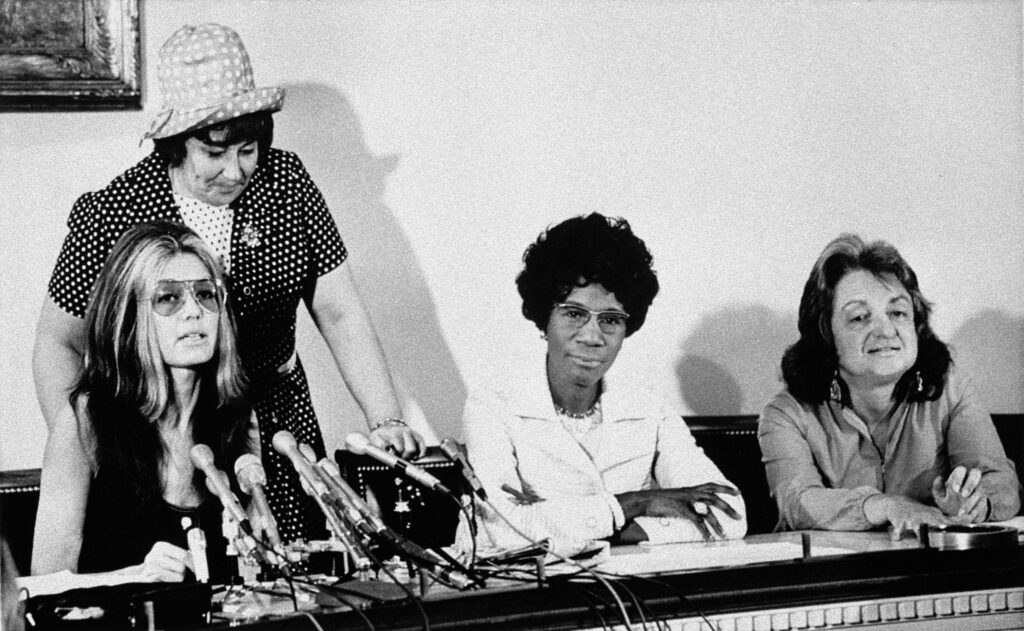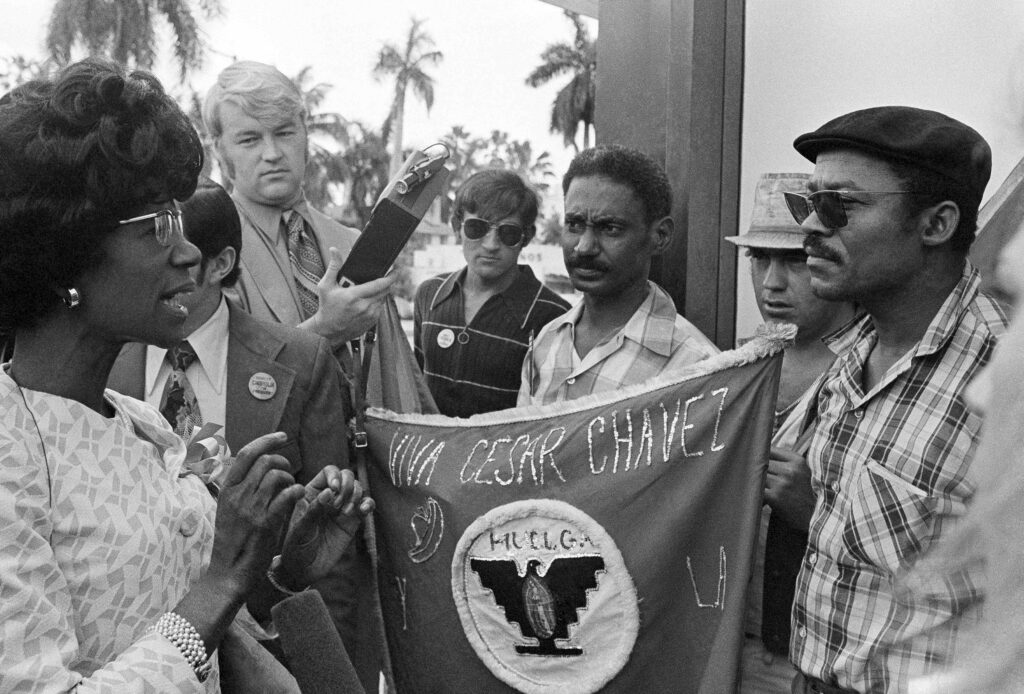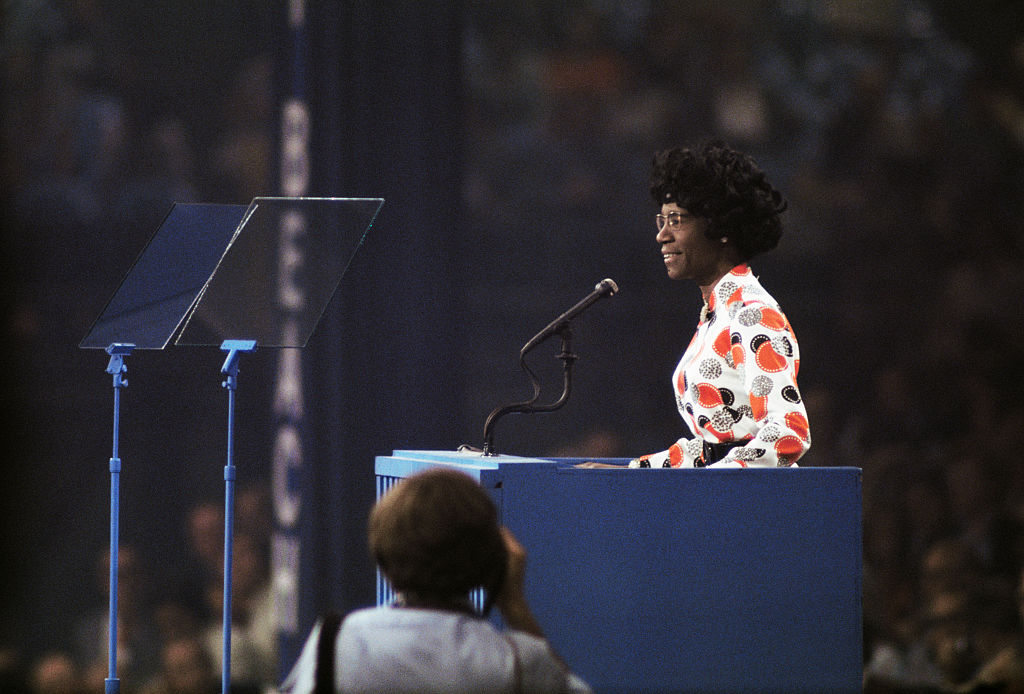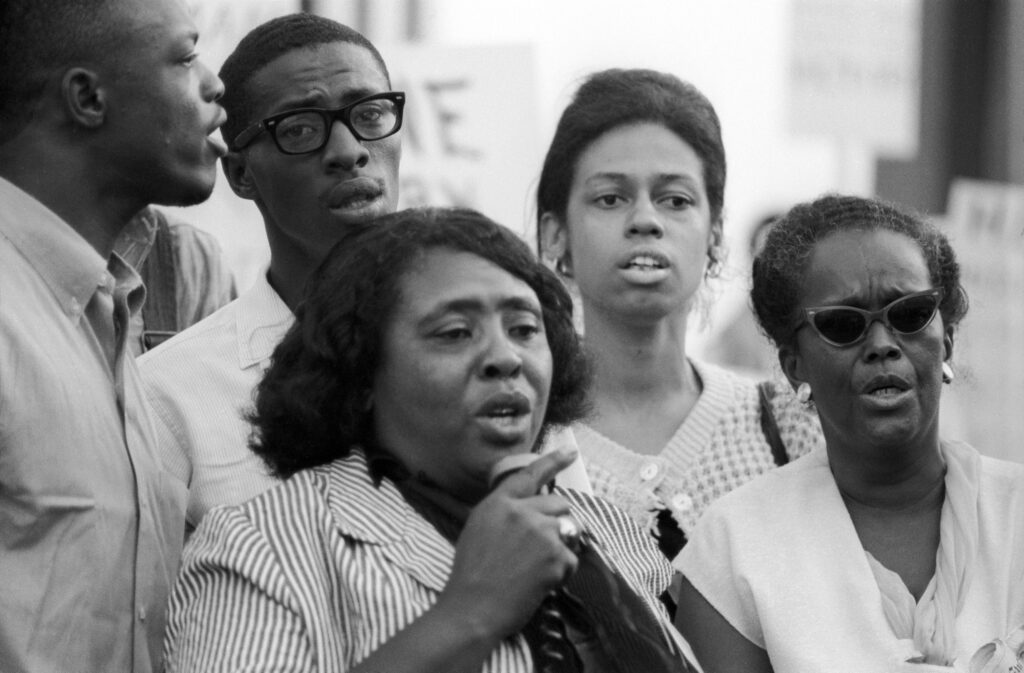How Shirley Chisholm Paved the Way for Kamala Harris
In a new oral history of the women’s movement, journalist Clara Bingham illuminates that and more
BY CINDI LEIVE
If, four weeks from now, Kamala Harris strides across a Chicago stage to become the Democratic nominee for president, it will be the first time a Black or South Asian woman has become a major party’s chosen candidate. But it will not be the first time a Black woman earned presidential delegates at the convention. That distinction belongs to former Congresswoman and 1972 presidential candidate Shirley Chisholm, who is one of the major players in Clara Bingham’s excellent and ridiculously well-timed new oral history, The Movement: How Women’s Liberation Transformed America, 1963-1973, out next week.
The Movement shatters the usual image of the Second Wave as being led solely by Gloria Steinem and Betty Friedan, and—through Bingham’s interviews with 100 veterans of the movement, along with archival material—introduces the reader to trailblazers like Martha Griffiths, who got Title IX passed, and Rita Mae Brown and the swashbuckling lesbians of the Lavender Menace, who stood up to Betty Friedan’s anti-gay stance by swarming the stage at a NOW convention. (If it all feels like a movie, it’s worth noting that one of Bingham’s previous books, Class Action, was made into the movie North Country, with Charlize Theron.)
In other words, there’s a lot in the book. But given the news of the week, we had to start with Shirley.

Cindi Leive: This book is landing in the middle of a wonderful burst of energy around Kamala Harris. How do you see this, having been immersed in all things early ’70s, but specifically the candidacy of Shirley Chisholm?
Clara Bingham: When Kamala Harris gave her acceptance speech back in 2020—when she and Joe Biden won the presidential election—she very specifically harkened back to women like Shirley Chisholm, who, she said, “fought and sacrificed so much for equality and liberty and justice for all…including the Black women who are often too often overlooked…but so often are the backbone of our democracy. I stand on their shoulders.” Those were the activists and intellectuals and organizers and leaders who paved the way for where we are today. And one of the most audacious of them was Shirley Chisholm.
Shirley Chisholm ran for Congress in 1968 from a newly created majority-Black district in Bed-Stuy, Brooklyn. And she defied the Democratic Party machine: The Black men who she’d worked with in the NAACP and different organizations in Brooklyn were upset with her for running and taking a seat from what would have been an African-American man. But because she rallied so many women voters and spoke fluent Spanish and basically knocked on every door in the district, she won. And she became the first Black woman member of Congress in January of 1969.

It’s hard to imagine now the level of extreme misogyny and racism that Shirley Chisholm faced when she walked the halls of Congress in the first few months of her tenure. It was so horrific. In one incident, she was having lunch in the members’ dining room during her first days there. And she sat at an empty table. A Southern Congressman came up to her and said “You’re sitting at the Georgia delegation table.” And he pointed to the New York delegation table across the room. She said, “I’m so sorry—I’ll just finish here. You’re welcome to join me.” But he refused, and she sat alone for the entire meal.
Another congressman from South Carolina, a pro-segregationist, would say “42,5,” every time she passed—meaning you’re earning $42,500, the same amount that he was earning. It was an insult to this man that she was allowed to receive a paycheck that was the same number as his.
And there was another Southern congressman who would spit into his handkerchief every time she passed him. And so this is a classic Shirley Chisholm reaction: She brought a handkerchief, and when she passed him and he spat into his handkerchief, she turned to him and said, ‘Oh, you might need another one!’ And handed it to him.
She had this ability to face down the misogyny and the racism that she put up with. And I think that is a lesson for Kamala Harris because she’s already the target of a barrage of misogynistic and racist attacks. We’re in a different place two generations later… except for one thing, we just lost our constitutional right to an abortion. And so that puts Kamala Harris right into the bullseye of what women need going forward.
Can you tell us a bit about Shirley Chisholm’s presidential run and the delegate votes that she received?
So Shirley Chisholm gets elected to Congress in 1968 and just four years later decides that she’s going to run for president. She doesn’t ask anybody for permission. She doesn’t ask anyone in the Democratic Party. She doesn’t ask the Black Congressional Caucus. She doesn’t ask the National Women’s Political Caucus [which] she helped found.
She and everyone else knew that she had no chance of winning. But it wasn’t just a symbolic race—it was a motivational and inspirational race. She realized that the white male Democrats were not speaking to a huge swath of potential American voters. They were not speaking to the youth vote—and at the time, in 1972, 46,200 U.S. soldiers had died in Vietnam. We were at the height of the Vietnam antiwar movement. We were at the height of the Black Power movement. We were at the height of the hippie counterculture. And also at the early but heady euphoric moment of the women’s liberation movement, which came out of all three of those other movements for social change. So she says, in her iconic speech at the Brooklyn Concord Baptist Church in January of 1972, these famous lines: “I am not the candidate of Black America, although I am Black and proud. I am not the candidate of the women’s movement of this country, although I am a woman and I’m equally proud of that. I am not the candidate of any political parties or fat cats or special interests. I stand here now without endorsements from many big name politicians or celebrities or any other kind of prop….and my presence before you now symbolizes a new era in American political history.” And it did, because she engaged with people who had felt alienated from the mainstream political process. She held huge rallies all over the country, although she was only on the ballot in eight states.

In the end, at the convention in Miami, she got 152 delegates—which is not many, but it’s some—and she became the first woman in the Democratic Party to have her name placed in nomination. That was such an important historical landmark. And when she then walked into the convention, she realized that even though she’d lost, she’d made a difference. She wrote, “I had felt that someday a Black person or a female person should run for the presidency of the United States, and now I was a catalyst of change.” That’s what she was…and that’s what Kamala Harris is now. In our new world.
You mentioned the other movements happening at the time—I’m not sure if it’s fully appreciated how much the civil-rights movement helped the birth of the quote-unquote women’s movement.
So many of the women—almost every single woman I interviewed—had been involved in the civil rights movement. And Black women who were on the forefront of the civil rights movement—women like Eleanor Holmes Norton, Pauli Murray, Florynce Kennedy, Frances Beal, the list goes on—were the legal architects and the moral architects of the second wave feminist movement. And that is something that I think people don’t understand. The leaders of this movement were women who came right out of the civil rights movement, and they were women who understood racism and the connection between racism and sexism. It took a lot of white women longer to get it.

One example I love is that the white women who were at Newsweek were beginning to realize that the system at that organization was completely discriminatory of all women. When they started to realize that maybe it was illegal for the masthead at Newsweek to have all men at the top and women at the bottom, they went to the ACLU and met Eleanor Holmes Norton. She was fresh from Mississippi—she’d gone down to help get Fannie Lou Hamer out of jail. She had to teach the women at Newsweek what discrimination was! Because so many of them had gone to Seven Sister colleges and were privileged and educated, they thought discrimination was just a race issue. Eleanor realized their case was classic discrimination—she had to have seminars with so many of the white women who were working in Newsweek to explain to them, this is discrimination, and this is how it works.
You talked about the opposition that Shirley Chisholm was going up against, and it makes me think about what Kamala Harris is going up against in Trump, and his exaggerated white masculinity—the way he has embraced the Hulk Hogan of it all. Does the opposition now feel even fiercer than it did then?
Shirley Chisholm and a lot of the early feminists had to face a Neanderthal-like sexism that even today, in Trump MAGA world, is hard to imagine. …Now we have Trump, who has this toxic masculinity and is a strongman—and is such a throwback. But these guys were so afraid of change. When it came to the fight over the ERA in 1972, there was a North Carolina Senator, Sam Ervin, a Democrat, who was born in 1896. He was born before suffrage! He was 24 when women first got the vote! And in 1972, he gave this crazy speech, where he said, “I am also constrained to offer this amendment because of my realization that my life has been made happy by a wife who has stood beside me for many years and has faithfully performed all of the obligations devolving upon her as a wife and mother.” He quotes from Genesis. And he [and his peers] were the first men in the world who had to contend with women forcing them to give them their rights. They had to relinquish those rights: The ERA passed with flying colors in both the House and the Senate—it was a bipartisan victory, which is really hard to imagine today.
But it didn’t pass. That’s one of the heartbreaks of your book.
I stopped the book in 1973, which really was one of the high points of the movement. Roe v. Wade had happened. The National Black Feminist Organization had launched. Billie Jean King beat Bobby Riggs in the Battle of the Sexes. Title IX had been passed, the ERA passed. After ’73, Phyllis Schlafly came on to the scene. And of course we all know that in the end, in her demonic and brilliant way, she managed to stop the ERA from being ratified by the states. If the ERA [were] the law of the land…I think we would be able to use it legally to argue for abortion rights.…And we can’t make that argument now, because we lost the ERA. It’s devastating.
You’ve spent years immersed in this history. Are you encouraged or discouraged by it?
Oh, I’m so encouraged!…This movement changed so many really ingrained, deep-seated customs that for thousands of years had placed women in a position of being second-class citizens. And so if you think of it, these men like Sam Ervin who were having to witness this change—it was completely rocking their world.
Trump is a modern iteration of the same thing. But you can’t put the genie back in the bottle. You know, he wants to—so do Brett Kavanaugh and JD Vance. They want to put women back, but that’s just never going to happen. It’s impossible.

Cindi Leive is the co-founder of The Meteor, the former editor-in-chief of Glamour and Self, and the author or producer of best-selling books.